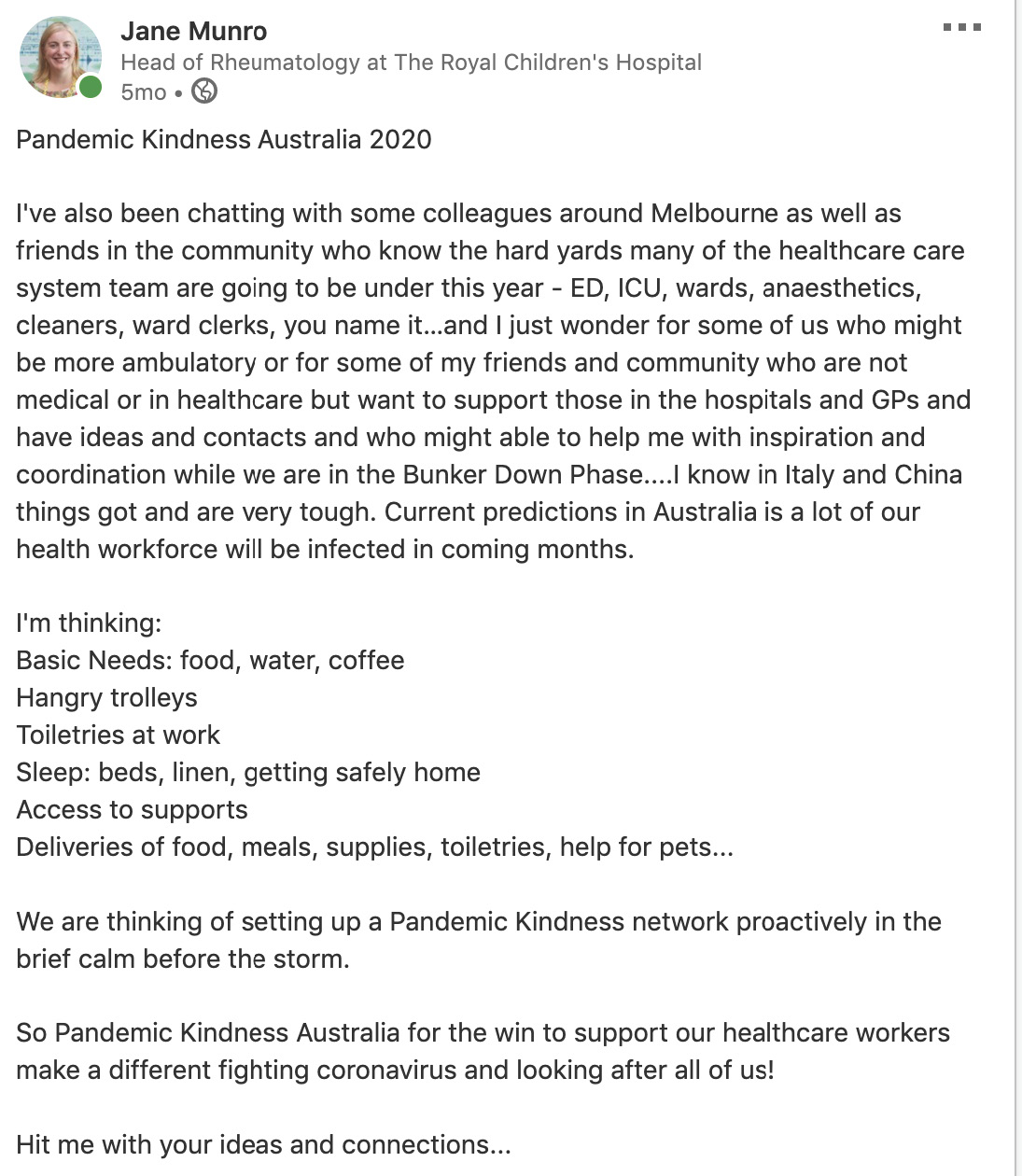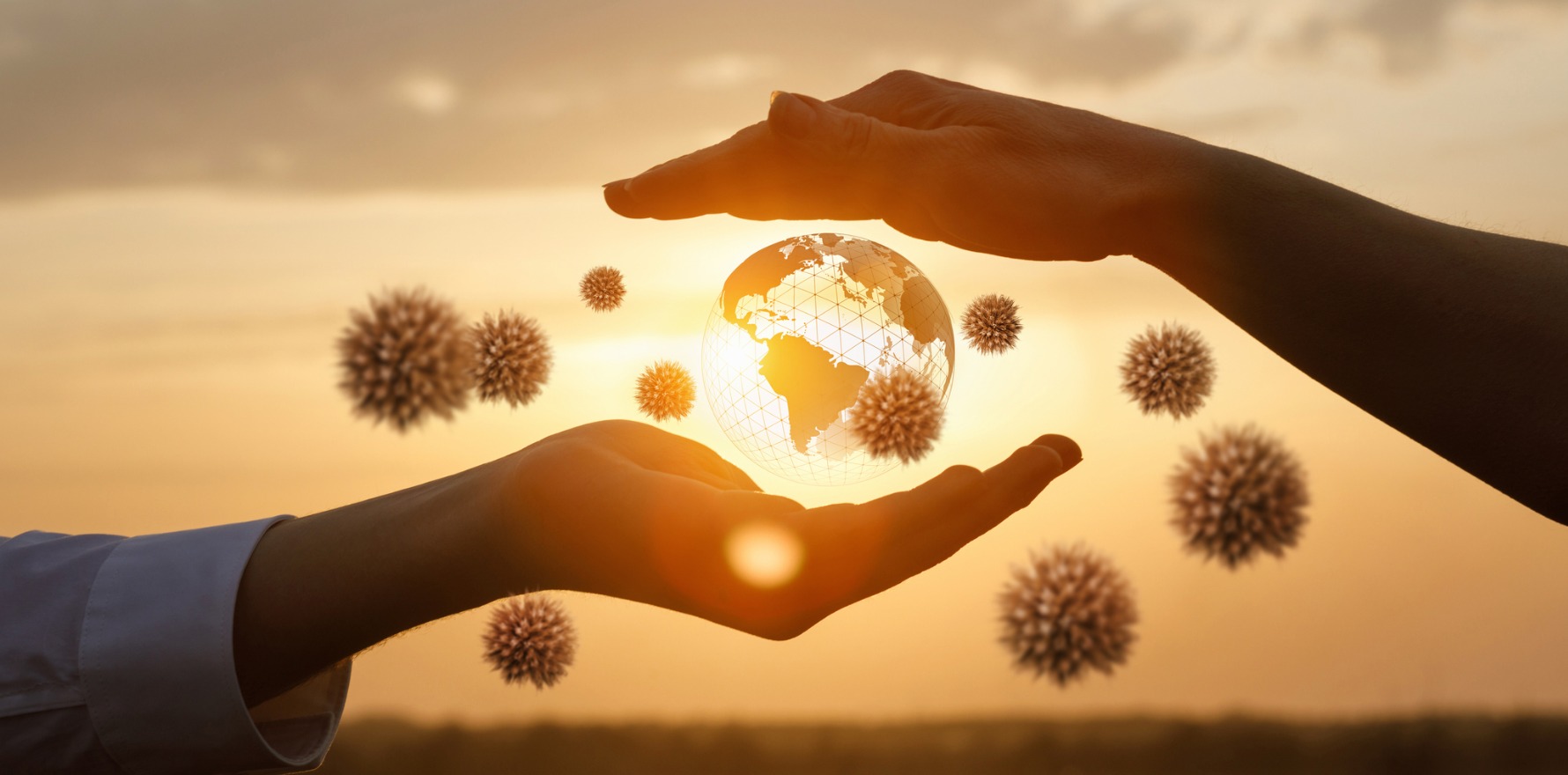COVID-19 triggered a tsunami of goodwill just when it was most needed by doctors.
The Pandemic Kindness Movement came about thanks to a bit of luck, social media on fire and people with big hearts.
It took off in March 2020 right when Australia’s healthcare workers were starting to feel the effects of COVID on our shores. All the healthcare workers I knew were in a state of somewhat frenzied preparation, many feeling rising levels of anxiety. We were concerned we may be soon to encounter the sort of scenes we had been seeing for weeks on our social media and news feeds from Wuhan, Bergamo and New York.
There were long days filled with moving to telehealth, physically altering our clinics, helping staff to work off site, changing practices in theatres, pivoting, learning at webinars until all times of the day and night. It was an exhausting and heady time of rapid change and innovation: a time of huge collaboration, where bureaucracy actually asked “how can we help?” and often let clinicians lead the way, resources were available, changes occurred quickly, but always on a background of uncertainty and imperfect systems.
By mid-March many healthcare workers talked about feeling like they were standing on the beach having watched the waves go all the way out, knowing it meant a tsunami was about to come back in to hit them, but being unable to leave. This was causing anxiety and a variety of responses. Almost no one was sleeping normally. Some people withdrew, some threw themselves into activity such as learning and advocacy. Others (many!) just tried to keep their heads above water. And of course, many were the carers for all the Australians who were starting to struggle themselves with this new reality of COVID. Clinicians were seeking basic information about how to best support themselves. Leaders were struggling to know how to lead and support their teams during a crisis and specifically the pandemic.
On the weekend of 14 March, right when the cases of COVID were taking off in Australia, there was a lot of discussion amongst my colleagues about what could be done to support Australian healthcare workers if this potential tsunami of COVID was to follow. After a WhatsApp group chat with senior medical staff was renamed Pandemic Kindness, I put up social media posts on the Saturday night on Twitter, LinkedIn and various medical Facebook groups with the following:

I awoke Sunday morning to my own social media tsunami! Awash with offers of all sort of kindnesses that included donations (money, mattresses, toiletries, food, accommodation for healthcare workers around Australia), influence and connection from politicians, CEOs, business leaders, entrepreneurs and government leaders, and many hundred doctors and healthcare workers (in particular from psychiatrists and psychiatry registrars). This led to a whirlwind of connections and brainstorming.
There were a few sliding door moments and a touch of serendipity and then within 72 hours the Pandemic Kindness Movement was born. Landing on what was needed and not duplicative was both difficult and easy. There was a desperate need at the time for diverse and high-quality information, which was carefully curated and relevant at the different phases of the pandemic.
We came together as a group of clinicians with expertise in doctor’s health and wellbeing as well as a range of other things. Fortunately, we were able to partner with the Agency for Clinical Innovation, Safer Care Victoria, the Commission on Excellence and Innovation in Health and Queensland Health. We have had excellent support from these agencies throughout. I particularly acknowledge the excellent support from Mike Palmer and Stacey Alexander. It was quite the milestone to get four states signed up, collaborating and the PKM leadership team and working groups established, a process for approving resources and the website up and running within six weeks. The clinicians who form the leadership group are Dr Tracey Tay, Dr Kym Jenkins, Dr Shahina Braganza, Mary Freer, Dr Sam Bendall and Dr Lynne McKinlay and it has been an absolute joy and privilege to work with them this past year. Their commitment to supporting healthcare workers, changing healthcare cultures and spreading kindness is inspiring.
It’s hard to reflect back, but in March 2020 there were many health services scrambling to provide even the most basic information about fatigue management, how to decontaminate yourself after a shift, how to manage your anxiety, or how to lead your team through a crisis.
We based the Pandemic Kindness Movement model on Maslow’s hierarchy of needs, with a few modifications. The pyramid representing these needs was adapted to reflect the potential challenges of the COVID-19 pandemic on the health workforce. In particular, effective leadership was seen as critical at all levels of the pyramid and was an additional “layer” represented in our model along the side.
The aim of the PKM was to provide health workers with easy access to curated resources to enable them to access the support they need. The pyramid is divided into the different needs: basic needs, safety, love and belonging, esteem, contribution and leadership actions. Mid-year we were able to collaborate and add in specific resources for aboriginal health workers.
We continue to meet every two weeks to plan for new initiatives, share what is happening nationally, review and add resources and monitor the uptake and use of the PKM resources. It was fascinating to see how as case numbers improved and things stabilised in Australia the access moved up through the pyramid. When Melbourne went into lockdown and healthcare workers had high infection rates in July and August, there were very high rates of use of Basic Needs resources again in Victoria compared to the other states.
The Pandemic Kindness Movement is a clinician-led project created by clinicians across Australia working together to support all health workers during the COVID-19 pandemic.
We love to hear from clinicians and health care workers and if you have a question or would like to provide feedback or suggest resources to include on the Pandemic Kindness Movement webpages, please email: ACI-kindness@health.nsw.gov.au or jane.munro@rch.org.au.
Associate Professor Jane Munro is a rheumatologist at the Royal Children’s Hospital in Melbourne.


